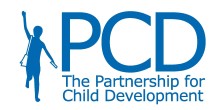Last Updated on Thursday, 04 September 2014 09:45
The Partnership for Child Development (PCD), Imperial College London an academic based organisation working in the area of School Health and Nutrition is providing technical support to Ghana School Feeding Programme (GSFP).
Among its support a nationwide training for regional and district stakeholders on food safety, health and hygiene was recently provided to school caterers involved in the preparation of the programme.
Read more: PCD Promotes Food Safety, Health and Hygiene in Ghana




